Loughborough Parish Library (3): curator James Bickham (1719-1785)
2 June 2023
His library tells us that the Rector James Bickham earned his learning through hard work.
We know he loved books: he bequeathed his library to his successors and left specific books as a gift to a friend in his last will and testament. Bickham also continued to acquire new publications until the end of his life. In 1785 he added two new books, a presentation copy of discourses by Thomas Balguy, Archdeacon of Winchester, and a volume of poems by Milton, both ©1785.
However, we see conclusive evidence that Bickham worked hard at his studies when we examine three books that have survived in the library. They are a Greek Grammar, a Latin book on public speaking by the Roman author Quintilian, and a modern treatise on law.
From the date of their publication, it can be assumed that Bickham used them as an undergraduate at Emmanuel College. The leaves of printed text are interleaved with blank leaves, a popular fashion of binding for people who used texts for study. In Bickham’s three college textbooks the blank leaves are covered with handwritten practice tracts of translation, vocabulary, commentary, and copied-out phrases.
We know that after graduating in 1740, Bickham became a Fellow of Emmanuel College from 1743-1761. He obtained this job thanks to his hard-earned erudition[1]. This Fellowship appears to have been his sole source of income.
We know that Bickham waited until he was aged 42 to marry the woman he loved. In 1761 Bickham arrived at Loughborough a bachelor, but was within three months married to Sarah Williams, his long-standing lady friend from Cambridge. Fellows were forbidden to marry, and it seems likely that Bickham could not afford to resign his Fellowship.
Emmanuel College had advowson – that is, the right to appoint members of the Anglican clergy for a vacant benefice[2]. However, this depended on a benefice becoming vacant upon the death or, more rarely, resignation of the incumbent[3]. It appears that Bickham had no other route, such as a wealthy patron or influential backer, beside the hope that college would provide him with a living.
However, it is also possible that he enjoyed the scholarly life in college and gave it up only for one of the richest benefices. Local historian Margaret Baker discovered in her research that in 1758, Bickham had been sent by his college to Loughborough to report on the effect the proposed Enclosure Act would have on the glebe lands of All Saints. In 1761 Bickham accepted Loughborough at the same time as the Enclosure Acts were passed.
Bickham’s old friends from Cambridge, who like him vied to secure positions in the Church (William Mason, poet and later canon of York Minster and Richard Hurd, author of essays and later bishop of Worcester) or struggled to remain employed in college (Thomas Gray, the poet best-known for Elegy in a Country Churchyard), gossiped specifically about the wealth of his benefice. Thomas Gray wrote to William Mason: “Jemmy Bickham is going off to a living, better than £400p.a., somewhere in the neighbourhood of Mr Hurd and his old flame, that he has nursed so many years, goes with him. I tell you this to make you pine.”
The reality of being a Rector at All Saints took Bickham away from reading his books. Margaret Baker suggests that because of Loughborough’s enclosure, people who fell on hard times did not pay their tithes[4]; consequently, Bickham filed in his first decade as Rector ten suits against parishioners, to collect his dues.
In the following decade Bickham undertook lengthy and expensive repairs to the Rectory, which he financed himself[5] as was his duty as Rector. As archdeacon of Leicester, Bickham completed visitations between 1773-1779 to all churches in his purview[6] and wrote detailed memoranda requesting improvements to the buildings, probably drawing on lessons learned from his restoration work in the Rectory, as well as calling to order slack and impious practices such as schooling children in the church, neglected vestments[7] and books.
His diligence and rigour in delivering his duties were noted by historians. Yet at the same time we note that he never published anything. In his last will and testament, Bickham specifically asked his executor to burn all his sermons, letters and papers. In fact, were it not for annotations left behind in books, we would have no personal statement from Bickham beside the instructions made during church visitations – and his testament.
Gray, Mason and Hurd left lasting bodies of published work behind. Bickham, however, did not. He was in awe of his writer friends, that much we can surmise. Remember the two volumes of Milton’s prose which he gifted to Hurd in his will? They are deluxe editions, worth considerably more than the four books Hurd gifted him, of which two were duplicates from Hartlebury Library, a library for which Hurd was custodian – not creator. Weeding [out] duplicates is a basic management measure in looking after library collections.
Hurd was Bickham’s junior by one year and both had matriculated as sizars at Emmanuel College. A sizar is, according to the glossary on the University of Cambridge’s website, “a student originally financing his studies by undertaking more or less menial tasks within his College and, as time went on, increasingly likely to receive small grants from the College”. Gray, on the other hand, had gone to Eton College before matriculating at Peterhouse, Cambridge, as a pensioner (meaning a fee-paying student).
As an undergraduate Bickham earned himself a reputation as a prize-fighter and it is tempting to imagine Gray “managing”, or rather running a book, on the talent of the slightly younger sizar. Bickham was a gifted linguist, not just writing freely in Latin, as we can glimpse from his marginalia, but collecting Don Quixote in both Spanish and Italian, alongside Italian editions of Tasso, and Machiavelli, to name just two of his favourite Italian authors. Yet we do not know whether he travelled abroad.
What is certain, is that Bickham would have seen his friend Gray depart in 1739 on his Grand Tour to Italy and France at the invitation of Horace Walpole, from Gray’s Eton circle of friends. With Horace Walpole, son of Prime Minister Robert Walpole, Gray spent two years abroad. It was not extravagant for middle-class clergymen like, for instance Lawrence Sterne, to embark on a Grand Tour. In Jonathan Swift, whose works Bickham collected avidly, and in Sterne, whose The Sermons of Mr. Yorick Bickham obtained by subscription, he beheld two leading lights of the literary world who had great careers in the Church just the same.
In the critical comments Bickham wrote in page margins and on blank leaves, he comes across as a frustrated critic, whose high standards are not being met by others. Further research is needed to confirm whether Bickham was being original, or whether he copied out paragraphs from other sources such as periodicals. Even if he was copying, however, his choice of quotes speaks of his character also:
- Flyleaf of Quintus Curtius Rufus’ 1705 Latin edition of the deeds of Alexander the Great inscribed in James Bickam’s hand: “Quintus Curtius is generally esteemed as an author rather qualified for a declaimer, than an historian, who took more pains to adorn his style & finish his periods than give a true & faithful account of things. Arrian’s History of Alexander is much preferable.”
- Inscription in Joseph Hall’s 1753 edition of his Virgidemiarium by Bickham, critiquing the author: “Which for him, who would be counted the first English Satyr, to abase himself to, who might have learn better among the Latin & Italian Satyrists & in our own poor Tongue from the ‘Vision & Creed of Pierce’s Plowman’, besides others before him, manifests a presumptuous undertaking with weak and unexamined shoulders. […]”.
- Finally, prefacing Bickham’s copy of the play The Rehearsal by George Villiers, Duke of Buckingham, a 17th century author, is another biting commentary. It draws on The Rehearsal’s satire, aimed at John Dryden, England’s first Poet Laureate, and possibly critiques 18th century contemporary poets, foremost the unnamed Poet Laureate, possibly William Whitehead (1757–85): “To see the incorrigibleness of our poets in their pedantick manner, their vanity, defiance of criticism, their Rhodomontade & poetical bravado, we need only turn to our famous Poet Laureate (the very Mr. Bays himself) in one of his latest and most values pieces […]”. If Bickham wrote this, he would have been aware that his friend Gray famously declined the position of Poet Laureate in 1757, when it was offered to him before going to Whitehead.
Beside such harsh criticisms, Bickham’s books contain numerous marginal corrections like proof-reader’s notes, which pick out typos, or change the meaning – not obviously for the better – by suggesting alternative words. Bickham “corrects” authors of unassailable status as well as lesser-known names. Ultimately, though, we do not know why Bickham shied away from becoming a published man of letters.
As for the works of his friends Gray, Mason and Hurd, Bickham carried a torch for them. He inscribed the title pages of books gifted to him clearly as “a gift from the author” and had Gray’s Elegy bound together with Mason’s Elfrida and a poem by Thomas Francklin, a Cambridge contemporary, as if in a reunion edition of old friends. Bickham probably never saw his college friends again, but he kept their books. Bickham’s legacy is this collection of books which, as we shall see in the next blog, encapsulates the tensions of his age, caught between remnants of Medieval scholastic traditions and the pressure to educate people across classes and genders for modern times.
Next blog: Which side is the LPL on in the battle between the ancients and the moderns?
© Article written by Manuscripts and Special Collections, University of Nottingham
Resources used:
Paget Toynbee and Leonard Whibley, Correspondence of Thomas Gray Volume 3 (1935)
Margaret Baker, The life and times of the Rectors of Loughborough (2012)
W.A. Pemberton, The Parochial Visitation of James Bickham D. Archdeacon of Leicester in the Years 1773 to 1779 (1985)
[1] Knowledge gained through learning/scholarship.
[2] An official role within the church, along with the income and other assets (such as a house and farmland) which went with it.
[3] A person holding such a role.
[4] Tithes were originally a one-tenth percentage of all agricultural produce which households were required to hand over to the church to support the local clergy. An act of parliament in 1836 converted this tax to a monetary payment. In effect, this was Bickham’s income, and anyone failing to pay their tithe reduced that income. (Taken from website of nationalarchives.gov.uk)
[5] Bickham paid for the renovations from the income he received as rector. It wasn’t uncommon for the clergy to resist making repairs and improvements to the houses they lived in but didn’t own, given that they could simply save the money these cost for their own personal use.
[6] Area of responsibility
[7] The garments worn during religious services by the clergy, their assistants, choristers, etc
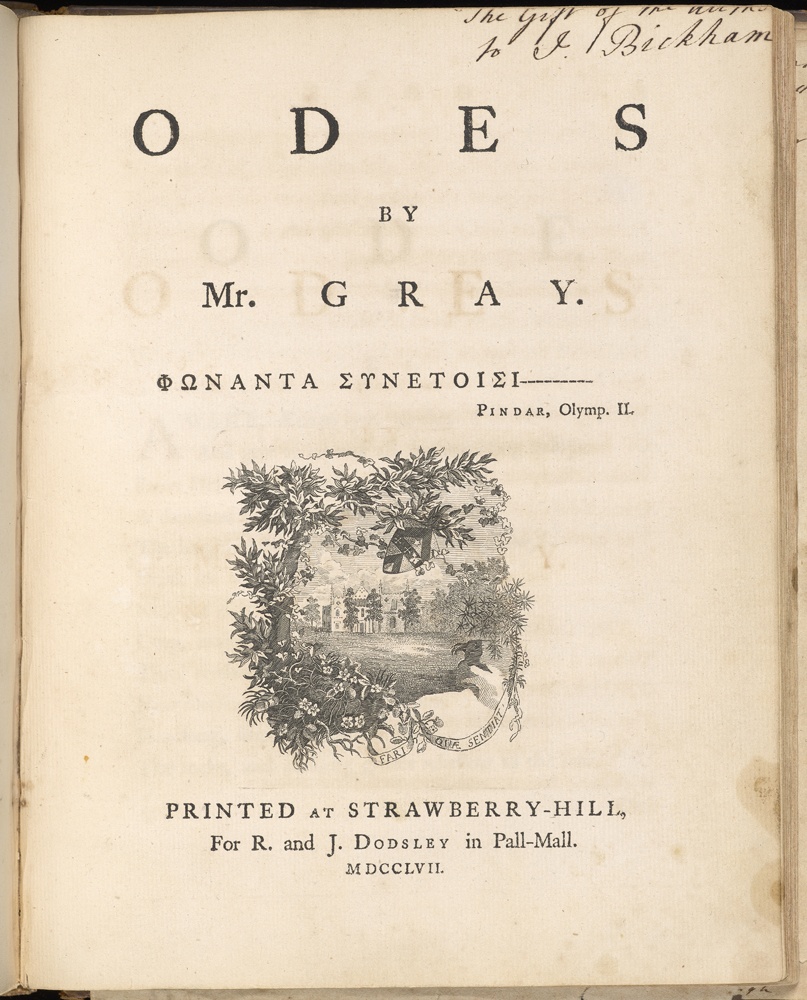
Loughborough Parish Library, PR3548.M2, barcode 100834608X.
© Manuscripts and Special Collections, University of Nottingham
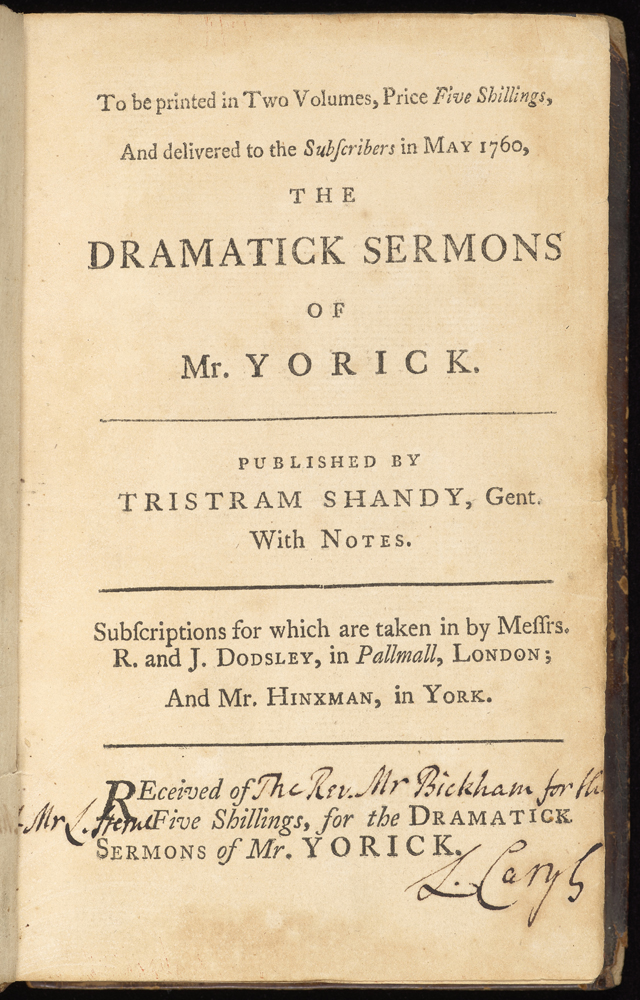
Loughborough Parish Library, PR3714.S3, barcode 1008382229.
© Manuscripts and Special Collections, University of Nottingham
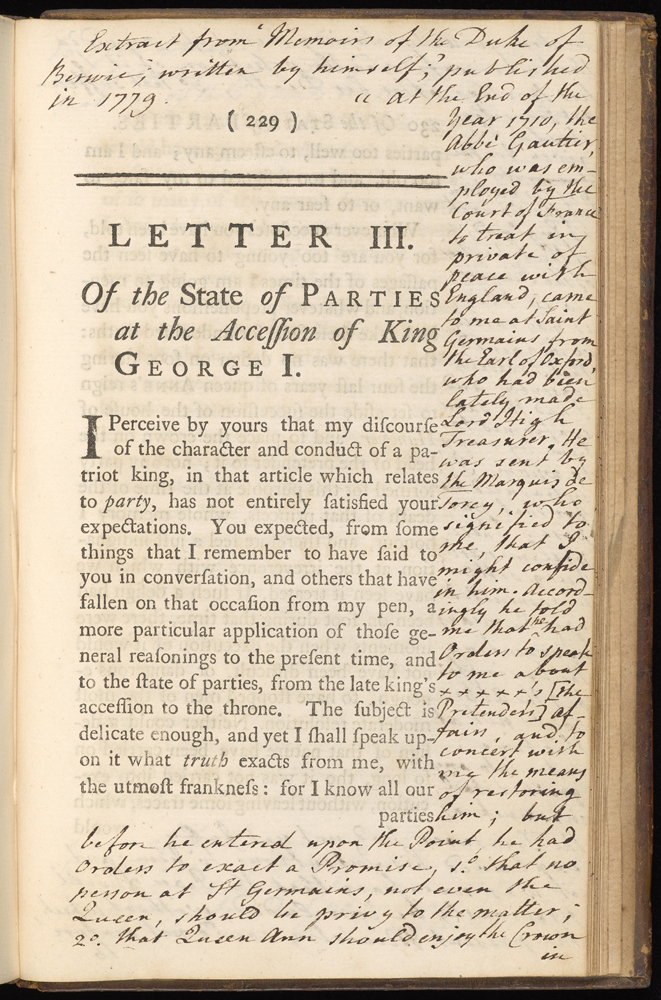
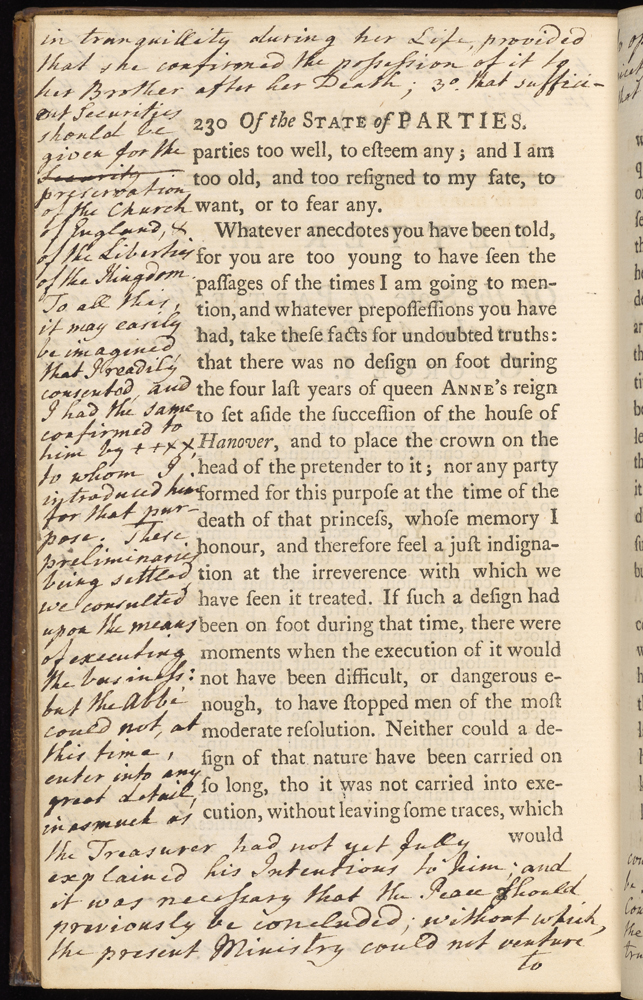
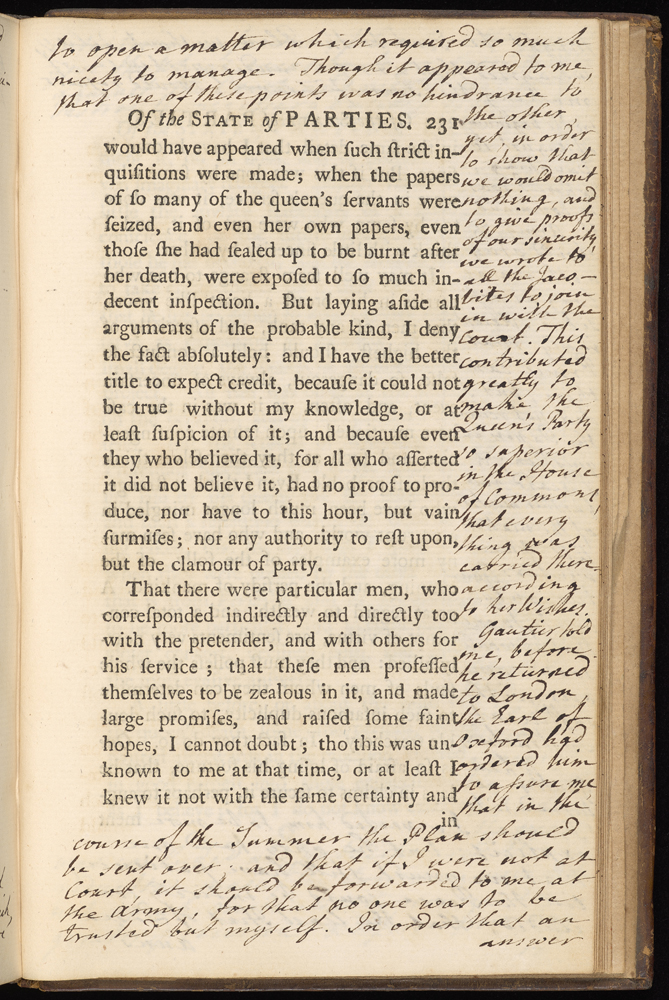
Three pages from a book of political philosophy with margins written in by James Bickham. He is copying from another text, ‘Memoirs of the Marshal Duke of Berwick’ (1779), to use as a parallel reference.
Henry St John, Viscount Bolingbroke, Letters, on the spirit of patriotism, on the idea of a patriot king, and on the state of parties, at the accession of King George the First (1749). Loughborough Parish Library, DA501.B6, barcode 1008382597.
© Manuscripts and Special Collections, University of Nottingham
Previous post: Loughborough Parish Library (2): poor rates and book plates
Next post: Loughborough Parish Library (4): the battle between the Ancients and the Moderns – which side is the LPL on?